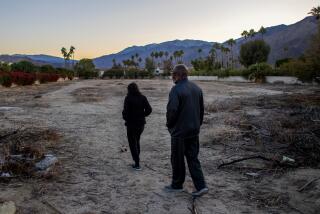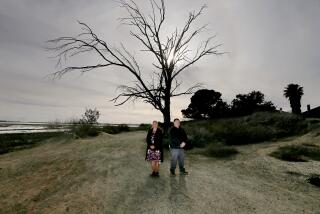Probe Asked Into Builder’s Find of Bones : Development: City urges investigation of Koll’s handling of remains at Bolsa Chica after protests by Native Americans.
- Share via
HUNTINGTON BEACH — Following angry speeches by Native Americans, the City Council Tuesday night voted to ask for a grand jury investigation into the Koll Real Estate Group’s handling of 8,000-year-old human bone fragments found near the Bolsa Chica wetlands.
“You’re dealing with the lives of fellow human beings,” said Councilman Ralph Bauer, who made the motion for the investigation. “All of us would like our ancestors to be treated with dignity.” His motion was approved on a 5-2 vote.
A group of Native Americans, as well as members of the council, have been angry over the issue since Jan. 25, when news reports revealed that an archeologist working for the Koll company had unearthed the bone fragments in 1992 directly in the path of the company’s proposed construction of 4,286 homes on or near the wetlands.
They were irate that the find had not been mentioned in a draft environmental impact report on the project released by the county late last year. And a map later leaked from the coroner’s office revealed that more than 20 subsequent bone clusters had been found, raising concerns that the 7.4-acre archeological site may have once been a prehistoric burial ground.
At issue is whether the Koll company, which owns most of the property, properly handled and reported the discovery of the bones, or whether it covered up the find to safeguard building plans.
Lucy Dunn, senior vice president of the Koll Group, said the company had done nothing wrong.
“We’ve abided by the law and followed all procedures,” she said. In a letter distributed to council members on Tuesday, Dunn described the call for a grand jury investigation as unwarranted.
“We are amazed and appalled that this matter is still on the agenda for consideration by the City Council,” she wrote. “There is no basis for a criminal investigation.”
A spokesman for the coroner’s office has said he is satisfied that the find was reported in a timely manner. Tom Mathews, director of planning for the county’s Environmental Management Agency, which oversaw preparation of the EIR, has said that the find was not mentioned in the document because its historical significance has not yet been scientifically validated.
Earlier this month, the issue drew about 600 residents to a city hearing on the EIR, at which the archeological finds were hotly discussed. A short time later, about 60 people, mostly Native Americans, protested on the steps of City Hall, saying that they had not been kept informed about their ancestors’ remains. And last week, Nancy Desautels--the archeologist who made the discovery--received a three-inch bullet in the mail bearing her name and the slogan “Remember Our Ancestors.”
The archeologist, who said she considered the mailing a serious death threat, turned it over to the FBI.
“We believe that if any investigation is warranted it is the FBI’s investigation into the threats made against Dr. Desautels,” Dunn said in her letter, which blamed the threat on the “emotionally charged atmosphere of suspicion, false allegations and anger” created by the city’s actions.
The emotional atmosphere continued Tuesday night as more than 10 Native Americans spoke in support of Bauer’s motion.
“This is an outrage,” said Gerald Millard, a Sioux from Los Angeles.
More to Read
Sign up for Essential California
The most important California stories and recommendations in your inbox every morning.
You may occasionally receive promotional content from the Los Angeles Times.













